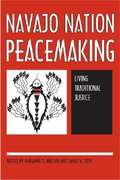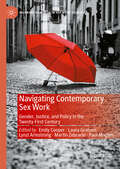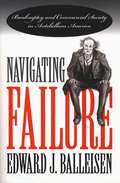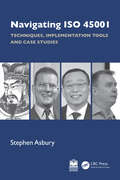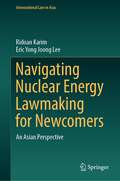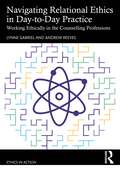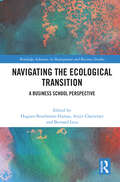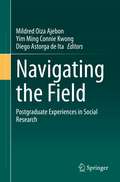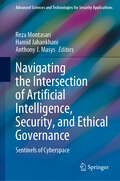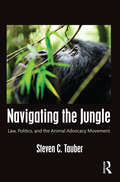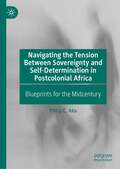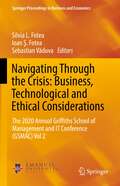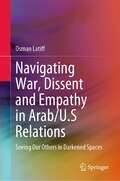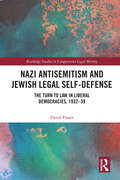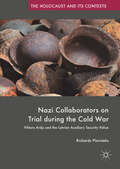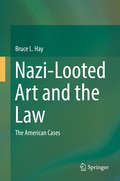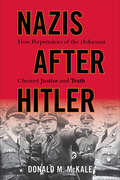- Table View
- List View
Navajo Nation Peacemaking: Living Traditional Justice
by Marianne O. Nielsen James W. ZionNavajo peacemaking is one of the most renowned restorative justice programs in the world. Neither mediation nor alternative dispute resolution, it has been called a horizontal system of justice because all participants are treated as equals with the purpose of preserving ongoing relationships and restoring harmony among involved parties. In peacemaking there is no coercion, and there are no sides. No one is labeled the offender or the victim, the plaintiff or the defendant. This is a book about peacemaking as it exists in the Navajo Nation today, describing its origins, history, context, and contributions with an eye toward sharing knowledge between Navajo and European-based criminal justice systems. It provides practitioners with information about important aspects of peacemakingÑsuch as structure, procedures, and outcomesÑthat will be useful for them as they work with the Navajo courts and the peacemakers. It also offers outsiders the first one-volume overview of this traditional form of justice. The collection comprises insights of individuals who have served within the Navajo Judicial Branch, voices that authoritatively reflect peacemaking from an insiders point of view. It also features an article by Justice Sandra Day OConnor and includes contributions from other scholars who, with the cooperation of the Navajo Nation, have worked to bring a comparative perspective to peacemaking research. In addition, some chapters describe the personal journey through which peacemaking takes the parties in a dispute, demonstrating that its purpose is not to fulfill some abstract notion of Justice but to restore harmony so that the participants are returned to good relations. Navajo Nation Peacemaking seeks to promote both peacemaking and Navajo common law development. By establishing the foundations of the Navajo way of natural justice and offering a vision for its future, it shows that there are many lessons offered by Navajo peacemaking for those who want to approach old problems in sensible new ways.
Navigating Contemporary Sex Work: Gender, Justice, and Policy in the Twenty-First Century (Palgrave Advances in Sex Work Studies)
by Emily Cooper Laura Graham Lynzi Armstrong Martin Zebracki Paul MaginnThis book draws together interdisciplinary perspectives to examine the legal, moral, and socio-spatial regulation of sex work in the contemporary context. With a thematic focus on the gendered landscape of sex work, formal and informal methods of socio-spatial control, and (in)access to justice, this book explores the role of space in the regulation of sex work in diverse contexts, from the local to the global. The chapters collectively bring together complex, inter-related issues that impact the lives of sex workers throughout the world, providing evidence of the impacts of regulation on sex workers and subsequent barriers to accessing justice and rights. This collection centres the regulated lives of sex workers, using an intersectional lens that highlights the gendered and racialised impacts of stigma. Incorporating knowledge derived from both academic research and lived experience, this book provides a unique contribution that will be of interest to academics and policy-makers globally.
Navigating Failure
by Edward J. BalleisenThe "self-made" man is a familiar figure in nineteenth-century American history. But the relentless expansion of market relations that facilitated such stories of commercial success also ensured that individual bankruptcy would become a prominent feature in the nation's economic landscape. In this ambitious foray into the shifting character of American capitalism, Edward Balleisen explores the economic roots and social meanings of bankruptcy, assessing the impact of widespread insolvency on the evolution of American law, business culture, and commercial society.Balleisen makes innovative use of the rich and previously overlooked court records generated by the 1841 Federal Bankruptcy Act, building his arguments on the commercial biographies of hundreds of failed business owners. He crafts a nuanced account of how responses to bankruptcy shaped two opposing elements of capitalist society in mid-nineteenth-century America--an entrepreneurial ethos grounded in risk taking and the ceaseless search for new markets, new products, and new ways of organizing economic activity, and an urban, middle-class sensibility increasingly averse to the dangers associated with independent proprietorship and increasingly predicated on salaried, white-collar employment.
Navigating ISO 45001: Techniques, Implementation Tools and Case Studies
by Stephen AsburyThere has been a 2,500-year evolution in structured means of control and management systems. Occupational health and safety management systems are an essential tool for initiating and driving cultural change, and for establishing a framework for continual improvement in safety performance. Navigating ISO 45001 charts this evolution up to the launch of the world’s first occupational health and safety management system (OH&S-MS) standard ISO 45001:2018, and then forecasts its future for the next ten years.This book delivers approaches and techniques that include the Navigating 45001: Three-Step Model, sixteen OH&S-MS implementation Toolkits, and 24 case studies presented as practical examples to facilitate your organization’s success in this critical business area. Acting as the essential companion to Health and Safety, Environment, and Quality Audits: A Risk-based Approach (Asbury, 2023) which is now in its fourth edition and has sold thousands of copies, this new book presents OH&S-MS from the organization’s side. Written with the safety manager in mind, it will become the "go-to" title for those who aspire to drive a prosperous and thriving organization based on world-class OH&S management and performance.Navigating ISO 45001 is an essential reading for senior managers and safety managers in any safety-critical role or profession.Downloadable and copyright-free documents, videos, and useful URL links are provided on the book’s companion website.
Navigating Nuclear Energy Lawmaking for Newcomers: An Asian Perspective (International Law in Asia)
by Ridoan Karim Eric Yong LeeThis book provides a comprehensive overview of the legal and regulatory framework for the nuclear industry from an Asian perspective. It includes information on the history of nuclear lawmaking, the key international treaties and agreements that govern the use of nuclear energy, the role of national and regional regulatory bodies, and the legal and policy issues that arise in the development and operation of nuclear power plants. The book also covers topics such as nuclear safety, security, waste management, environmental protection, and liability for nuclear accidents. Additionally, it provides insights into the legislative process and the various stakeholders involved in nuclear lawmaking, such as industry, government, and civil society organizations. The overall goal of this book is to provide a detailed and up-to-date understanding of the legal and regulatory framework for the nuclear newcomers, particularly in Asia, and to help readers navigate this complex and dynamic field.The book is also used as a guide for all nuclear energy-producing countries, lawmakers, students, researchers, or even for general readers to understand the perspectives of international nuclear energy law.
Navigating Relational Ethics in Day-to-Day Practice: Working Ethically in the Counselling Professions (Ethics In Action)
by Andrew Reeves Lynne GabrielThe first in a new series on ethics in the counselling professions, Navigating Relational Ethics in Day-to-Day Practice contextualises the series and provides a practical ‘how to’ guide for bringing the theoretical concepts of ethics into practice. Lynne Gabriel and Andrew Reeves provide a compelling explanatory narrative on the importance of translating ethical concepts into meaningful pragmatic practice and practitioner tools. They set out key theories, concepts, and contemporary challenges in practice ethics, offering multiple lenses through which to make meaning of complex practice or risk scenarios and settings. Importantly, the book considers contemporary concepts associated with social justice including working in anti-oppressive ways. The chapters feature an array of engaging material, including a round table dialogue on working ethically in day-to-day practice, a ‘toolkit’ for working ethically across multiple contexts and presenting issues, and a rich collection of case examples from the authors’ lived experience.This text supports trainees and practitioners in taking ethical frameworks into their direct work with clients and in their wider role in practice.
Navigating the Ecological Transition: A Business School Perspective (Routledge Advances in Management and Business Studies)
by Hugues Bouthinon-Dumas Arijit Chatterjee Bernard LecaThe transition towards sustainability is now a major issue that has taken centre stage in public debate, policy circles, scientific forums, and business roundtables. Higher education institutions focusing on educating tomorrow’s managers and leaders and on business practices are doubly challenged by this development. On the one hand, they must be accountable to their internal stakeholders who strongly identify with the new “environmental awakening”. On the other hand, because of their status as research institutions, they must provide answers and propose solutions to face this challenge which is shaping up to be the most crucial issue that humanity has had to face in the modern era.In this book, faculty and researchers from École Supérieure de Sciences Économiques et Commerciales (ESSEC Business School), a recognized leader among European schools of business and management, provide a multi-faceted perspective on the different areas that need to be considered to understand the new market dynamics during this environmental and social transition. The book identifies the obstacles that come in the way of the transformation of dominant business models, and how to overcome them in order to move away from “business as usual”. The various chapters in this work offer a vast diversity of approaches that address the paradigm shift towards sustainability, providing insights for both business and higher education. The book includes chapters from seven different departments at ESSEC: Management; Accounting and Management Control; Economics; Information Systems; Decision Sciences and Statistics; Marketing; Operations Management; and Public and Private Policy.Research-based and combining theory with practice, this thought-provoking book will be welcomed by academics, institutions, and professionals alike, wishing to gain perspectives on the challenges of the transition towards a sustainable society.
Navigating the Field: Postgraduate Experiences in Social Research
by Mildred Oiza Ajebon Yim Ming Connie Kwong Diego Astorga de ItaThis volume is a collation of postgraduate fieldwork experiences in social research that provides a platform for early career researchers (ECRs) to be open about the hidden labour of doing postgraduate fieldwork. This book documents diverse fieldwork experiences, gathering critical reflections on ‘the field’ from a wide range of ECRs. The issues presented here go from the process of identifying the field to navigating life in (and after) it, including things that happen in-between. This text shows a different set of methodological considerations in relation to access, ethics, identity, positionality, power and practices, highlighting how ECRs' fieldwork experiences may help broaden traditional frameworks of research. Exploring how postgraduate researchers make sense of these issues and what kind of decisions they make in specific circumstances helps to reveal broader concerns, institutional practices and constraints. Through these reflections, this book makes an important point that there is a need for researchers to document the ‘real story’ behind fieldwork. The honesty and openness of contributors in this volume are positive steps towards fostering a research culture where reflections upon weaknesses and failures are as welcome as presentations of successful fieldwork techniques and methods.The fact that this book is written and edited by ECRs, the topics it presents — both emerging and long-debated but still relevant — and the broad range of approaches make this text unique. We hope these points will make this work useful for researchers of all levels and across disciplines, and that this text will allow the reader to rethink some essential aspects of social research that are often taken for granted. We expect the diverse reflections offered in this book to appeal to researchers across disciplines at different stages of their career and that this will be a useful resource for researchers to map and navigate their own research pathways.
Navigating the Fundamentals of Immigration Law
by Grace E. AkersThis book is designed as a "core curriculum" handbook, focusing on the fundamental elements of immigration law and practice.
Navigating the Intersection of Artificial Intelligence, Security, and Ethical Governance: Sentinels of Cyberspace (Advanced Sciences and Technologies for Security Applications)
by Reza Montasari Hamid Jahankhani Anthony J. MasysThis book not only equips the readers with the essential knowledge to gain a nuanced understanding of the present cyber threat landscape but also offers strategic foresight to navigate the challenges looming on our digital horizon. In the ever-evolving realm of cyberspace, this meticulously crafted book reveals the escalating cyber threats challenging the foundations of global security and governance. Unprecedented in its synthesis of academic rigour and practical insight, “Sentinels of Cyberspace: Navigating the Intersection of AI, Security, and Ethical Governance in Western Democracies” demystifies the complex relationship between cybersecurity and AI. Rich with comprehensive literature reviews, insightful case studies, and forward-looking perspectives, this book serves as an indispensable guide for scholars, policymakers, practitioners, researchers, and all those concerned with the security fabric of Western democracies. Its unique blend of theoretical frameworks and real-world scenarios creates a transformative bridge between academic discourse and practical application. From foundational explorations of AI to in-depth analyses of its applications in decision-making, crime analysis, counter-terrorism, and predictive modelling, each chapter weaves a narrative that not only articulates contemporary challenges but also lays the groundwork for practical solutions. This transformative work actively engages with ethical dimensions, ensuring a delicate balance between theoretical insights and actionable considerations. More than just informative, “Sentinels of Cyberspace: Navigating the Intersection of Artificial Intelligence, Security, and Ethical Governance in Western Democracies” is a roadmap to navigate the intricate landscape of cybersecurity and AI integration, propelling the discourse towards innovative solutions. For those intrigued by the evolving dynamics of our digital era, this book is an essential companion, offering strategic foresight to understand and address the pressing issues at the intersection of technology, security, and governance.
Navigating the Jungle: Law, Politics, and the Animal Advocacy Movement
by Steven C. TauberFor much of our history, legal scholars focused predominantly on the law's implications for human beings, while ignoring how the law influences animal welfare. Since the 1970s, however, there has been a steep increase in animal advocates' use of the courts. Animal law has blossomed into a vibrant academic discipline, with a rich literature that examines how the law affects animal welfare and the ability of humans to advocate on behalf of nonhuman animals. But most animal law literature tends to be doctrinally-based or normative. There has been little empirical study of the outcomes of animal law cases and there has been very little attention paid to the political influences of these outcomes. This book fills the gap in animal law literature. This is the first empirically-based analysis of animal law that emphasizes the political forces that shape animal law outcomes.
Navigating the Tension Between Sovereignty and Self-Determination in Postcolonial Africa: Blueprints for the Midcentury
by Philip C. AkaThis book addresses the unique challenges faced by Africa regarding peaceful self-determination. Unlike other regions, Africa has seen limited success in nonviolent self-determination campaigns. Since 1989, only three African nations - Namibia, Eritrea, and South Sudan - have joined the UN after enduring prolonged and violent struggles for independence. In a world characterized by constant change, border alterations typically require armed conflicts in postcolonial Africa. In response to this disconcerting trend, the book offers pragmatic blueprints for achieving peace, emphasizing constitutional approaches to navigate the delicate balance between sovereignty and self-determination. The work delves into the complexities of five self-determination struggles spanning three African countries, providing valuable insights into the challenges faced. It distils six critical lessons from these case studies and presents fourteen blueprint proposals tailored to address the unique dynamics of postcolonial Africa, where reconciling sovereignty and self-determination remains a pressing concern.
Navigating Through the Crisis: The 2020 Annual Griffiths School of Management and IT Conference (GSMAC) Vol 2 (Springer Proceedings in Business and Economics)
by Silvia L. Fotea Ioan Ş. Fotea Sebastian VăduvaThis proceedings volume provides a multifaceted perspective on the unprecedented crises generated by the global COVID-19 pandemic, and its ramifications for individuals, businesses, organizations, governments and systems in developing countries. Featuring selected papers from the 2020 Annual Griffiths School of Management and IT Conference (GSMAC), held in Oradea, Romania, this volume focuses on business, technological and ethical considerations in the process of navigating through a global crisis. It analyzes the effectiveness of different measures taken at individual, organizational and country level and outlines potential scenarios and solutions for the new post-crisis reality. Finally, the book provides diagnosis and recommendations for managerial practice in various industries impacted.
Navigating War, Dissent and Empathy in Arab/U.S Relations: Seeing Our Others in Darkened Spaces
by Osman LatiffThis book focuses on American political discourse connected to war, dissent, and empathy. Through interdisciplinary methods of history, politics and media studies, the book examines ways in which American self-identity alters as a consequence of media portrayal of human suffering and of its existential others. It compares representations of the Iraq wars to earlier precedents and looks at the work of American activists, assessing how narratives and images of human suffering in new media iconography generate empathic attitudes towards others. This comparative, multimodal study helps to explain shifting self-identities within the U.S, and relationally through the representation of the Arab other presenting an original and historicised contribution to the media-war field of academic and public debate. The book underscores empathy as a vibrant category of analysis that expands how we think about West-Arab relations, revealing how understanding the cultural aspects of this conflictual interrelationship needs to be broadened.
The Navy Jag Collection: Detained and Code 13
by Don BrownCode 13Caroline is just getting her feet wet at the prestigious Code 13, but is thankful for at least one familiar face—her old flame, P.J. MacDonald. He loops her into the assignment he is currently working on—the legality of a proposed drone-sharing contract with Homeland Security that would allow the sale of drones for domestic surveillance. The contractor wants a legal opinion clearing the contract for congressional approval. But the mob wants the proposal dead-on-arrival.DetainedA man and his son dreamed of America’s freedom, but the dream became a nightmare when they ended up at Guantánamo Bay.
Nazi Antisemitism and Jewish Legal Self-Defense: The Turn to Law in Liberal Democracies, 1932–39 (Routledge Studies in Comparative Legal History)
by David FraserOne of the first to provide a socio-legal comparative history of under-studied or ignored Jewish attempts in the 1930s "Anglosphere" to counter the rise in fascist and Nazi antisemitism, this book examines the ways in which Jewish individuals and organized communal bodies in the mid-to-late 1930s sought to counter this increasing antisemitic violence, physical and verbal, by using the law against their fascist and Nazi attackers. This is the first study to explore how Jews in these countries organized themselves, brought their oppressors to court, while seeking to convince their governments that an attack on Jews was a threat to the social order. The book analyzes the networks of knowledge and the personal relationships between and among key actors and institutions of the "Antisemitic International." Nazi "nationalists" always participated in networks that transcended borders. Case studies from Canada, South Africa, the United Kingdom, and the United States, illustrate the ways in which different mechanisms of Jewish resistance were deployed throughout the mid-to-late 1930s. They embody significant concerns about the "turn to law" and the importance of litigation and legislation. Grounded in original archival research on three continents, the book examines the ways in which professional legal discourse about public order and democratic citizenship proffered by Jewish communities and individual Jews was countered by their Nazi opponents with legal and political arguments about "truth," "persecution," and Jewish perfidy. The book will be of interest to students, academics, and researchers working in the areas of Legal History, History, Jewish Studies, the study of Antisemitism, and the History of the far right, fascism and Nazism.
Nazi Billionaires: The Dark History of Germany's Wealthiest Dynasties
by David de Jong“A provocative group portrait of five industrialists who expanded their fortunes by colluding with Hitler and then, after World War II, walked away with minimal punishment and barely a dent in their bottom lines... In this meticulously researched book, Mr. de Jong, an investigative journalist and former reporter at Bloomberg News, compels us to confront the current-day legacy of these Nazi ties."—The Wall Street JournalA groundbreaking investigation of how the Nazis helped German tycoons make billions off the horrors of the Third Reich and World War II—and how America allowed them to get away with it.In 1946, Günther Quandt—patriarch of Germany’s most iconic industrial empire, a dynasty that today controls BMW—was arrested for suspected Nazi collaboration. Quandt claimed that he had been forced to join the party by his archrival, propaganda minister Joseph Goebbels, and the courts acquitted him. But Quandt lied. And his heirs, and those of other Nazi billionaires, have only grown wealthier in the generations since, while their reckoning with this dark past remains incomplete at best. Many of them continue to control swaths of the world economy, owning iconic brands whose products blanket the globe. The brutal legacy of the dynasties that dominated Daimler-Benz, cofounded Allianz, and still control Porsche, Volkswagen, and BMW has remained hidden in plain sight—until now.In this landmark work of investigative journalism, David de Jong reveals the true story of how Germany’s wealthiest business dynasties amassed untold money and power by abetting the atrocities of the Third Reich. Using a wealth of untapped sources, de Jong shows how these tycoons seized Jewish businesses, procured slave laborers, and ramped up weapons production to equip Hitler’s army as Europe burned around them. Most shocking of all, de Jong exposes how America’s political expediency enabled these billionaires to get away with their crimes, covering up a bloodstain that defiles the German and global economy to this day.
Nazi Collaborators on Trial during the Cold War
by Richards PlavnieksThis book is a study of the legal reckoning with the crimes of the Latvian Auxiliary Security Police and its political dimensions in the Soviet Union, West and East Germany, and the United States in the context of the Cold War. Decades of work by prosecutors have established the facts of Latvian collaboration with the Nazis during the Holocaust. No group made a deeper mark in the annals of atrocity than the men of the so-called 'Arajs Kommando' and their leader, Viktors Arājs, who killed tens of thousands of Jews on Latvian soil and participated in every aspect of the 'Holocaust by Bullets. ' This study also has significance for coming to terms with Latvia's encounter with Nazism - a process that was stunted and distorted by Latvia's domination by the USSR until 1991. Examining the country's most notorious killers, their fates on both sides of the Iron Curtain, and contemporary Latvians' responses in different political contexts, this volume is a record of the earliest phases of this process, which must now continue and to which this book contributes.
The Nazi Doctors: Medical Killing and the Psychology of Genocide
by Robert LiftonIn his most powerful and important book, renowned psychiatrist Robert Jay Lifton presents a brilliant analysis of the crucial role that German doctors played in the Nazi genocide. Now updated with a new preface, The Nazi Doctors remains the definitive work on the Nazi medical atrocities, a chilling exposé of the banality of evil at its epitome, and a sobering reminder of the darkest side of human nature.
Nazi Hunter: The Wiesenthal File
by Alan LevySimon Wiesenthal spent four and a half years in Mauthausen concentration camp during World War II. With the exception of his wife, all his immediate family were exterminated, and he himself ended the war a living skeleton. Since then, he has achieved international reknown for his tireless and successful tracking down of Nazi war criminals, including notorious figures such as Eichmann, the 'desk murderer' who masterminded Hitler's Final Solution; Stangl the overlord of Treblinka; and the Mengele of Auschwitz, the dreaded 'Angel of Death'. To this day his work continues, his motivation simply expressed in the words: 'Justice, not vengeance'. This work provides an account of Wiesenthal's inspired detective work.
Nazi Hunter: The Wiesenthal File
by Alan LevySimon Wiesenthal spent four and a half years in Mauthausen concentration camp during World War II. With the exception of his wife, all his immediate family were exterminated, and he himself ended the war a living skeleton. Since then, he has achieved international reknown for his tireless and successful tracking down of Nazi war criminals, including notorious figures such as Eichmann, the 'desk murderer' who masterminded Hitler's Final Solution; Stangl the overlord of Treblinka; and the Mengele of Auschwitz, the dreaded 'Angel of Death'. To this day his work continues, his motivation simply expressed in the words: 'Justice, not vengeance'. This work provides an account of Wiesenthal's inspired detective work.
Nazi-Looted Art and the Law
by Bruce L. HayThis book offers a clear, accessible account of the American litigation over the restitution of works of art taken from Jewish families during the Holocaust. For the past two decades, the courts of the United States have been an arena of conflict over this issue that has recently captured widespread public attention. In a series of cases, survivors and heirs have come forward to claim artworks in public and private collections around the world, asserting that they were seized by the Nazis or were sold under duress by owners desperate to escape occupied countries. Spanning two continents and three-quarters of a century, the cases confront the courts with complex problems of domestic and international law, clashes among the laws of different jurisdictions, factual uncertainties about the movements of art during and after the war, and the persistent question whether restitution claims have been extinguished by the passage of time.Through individual case studies, the book examines the legal questions these conflicts have raised and the answers the courts have given. From the internationally celebrated “Woman in Gold” lawsuit against Austria to lesser-known claims against Germany, Hungary, Spain, and museums and private collections in the United States, the book synthesizes the legal and evidentiary materials and judicial rulings in each case, creating a coherent narrative of proceedings that are often labyrinthine in complexity. Written by a leading authority on litigation and procedure, the book will be of interest to readers in various fields of the humanities and social sciences as well as law, and to anyone interested in the fate of artworks that have been called the “last prisoners” of the Second World War.
Nazi War Crimes, US Intelligence and Selective Prosecution at Nuremberg: Controversies Regarding the Role of the Office of Strategic Services
by Michael SalterReviewing recently declassified CIA documents, this book provides a balanced but critical discussion of the contribution of American intelligence officials to the Nuremberg war crimes trials. Giving new details of how senior Nazi war criminals, such as SS General Karl Wolff, were provided with effective immunity deals, partly as a reward for their wartime cooperation with US intelligence officials, including Allen Dulles, former CIA Director, the author also discusses the role of such officials in mobilizing the unique resources of a modern intelligence agency to provide important trial testimony and vital documentary evidence. Nazi War Crimes, US Intelligence and Selective Prosecution at Nuremberg argues that both war crimes prosecutors and intelligence officials can engage in mutually beneficial collaborations, but that both sides need to recognize and appreciate the problems that may arise from the fact that these institutions are required to operate according to different, and in some cases contradictory, agendas. This topical book gives those studying, or with interests in, international law, criminal law and history an insight into the debates surrounding international war crimes, within the context of the Nuremberg war crimes trials.
Nazis after Hitler: How Perpetrators of the Holocaust Cheated Justice and Truth
by Donald M McKaleThe stories of thirty war criminals who escaped accountability, from a historian praised for his &“well written, scrupulously researched&” work (The New York Times). This deeply researched book traces the biographies of thirty &“typical&” perpetrators of the Holocaust—some well-known, some obscure—who survived World War II. Donald M. McKale reveals the shocking reality that the perpetrators were rarely, if ever, tried or punished for their crimes, and nearly all alleged their innocence in Germany&’s extermination of nearly six million European Jews. He highlights the bitter contrasts between the comfortable postwar lives of many war criminals and the enduring suffering of their victims, and how, in the face of exhaustive evidence showing their culpability, nearly all claimed ignorance of what was going on—and insisted they had done nothing wrong. &“McKale ends the book with a haunting question: whether life would be different today if the Allies had pursued Holocaust criminals more aggressively after WWII. History buffs and students of the Holocaust will be fascinated.&” ―Publishers Weekly &“Gripping and important reading.&” —Eric A. Johnson, author of What We Knew
Ne bis in idem and Multiple Sanctioning Systems: A Case Law Study of the European Court of Human Rights and the Court of Justice of the EU (Legal Studies in International, European and Comparative Criminal Law #8)
by Javier Ignacio Escobar VeasThe aim of the book is to resolve the question of whether multiple sanctioning systems are contrary to the ne bis in idem under the regulation provided by Protocol 7 to the ECHR and the EU Charter of Fundamental Rights. The first part is a comparative study regarding the lawfulness of multiple sanctioning systems under the ne bis in idem, studying the evolution and the current state of the case law of the United States Supreme Court, the Canadian Supreme Court, the Spanish Constitutional Court, the European Court of Human Rights (ECtHR) and the Court of Justice of the European Union (CJEU). The second part of the book critically analyses three problems with the case law of the ECtHR and the CJEU. Part three deals with reconceptualizing the prohibition of multiple punishment and the prohibition of multiple prosecutions. Finally, the fourth part addresses other possible protections against multiple sanctioning systems. Two other safeguards that limit multiple sanctioning systems are the prohibition of disproportionate sanctions and the right to be tried within a reasonable time.
